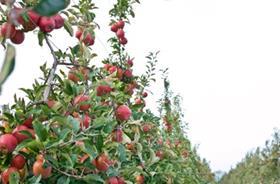
A collaborative programme involving some of the world’s leading research institutes is set to give apple growers additional insight into when and how to apply chemical thinners to achieve optimal profitability.
Dubbed the AppleGenie project, the programme has seen researchers from IRTA (Spain), Plant & Food Research (New Zealand), CTIFL (France) and the University of Bologna (Italy) combining their studies with end-users and high-end consultancy providers to develop a set of new tools, which will help to address bottlenecks and challenges currently associated with high-end apple production.
“The predictive diagnostics are based on gene expression for rapid assessment of cropload programmes and bitter pit disorder in apple,” according to a press release issued by AppleGenie. “The tools are based on molecular diagnostics, meaning that information from relevant changes in gene expression of the apple itself forms the basis of the tests.”
Plant & Food Research’s business manager, Declan Graham, and Peter Balk, chief technical officer of NSURE, a spin-off from Holland’s Wageningen University, will be presenting on the AppleGenie project at Fruit Logistica in Berlin during February. The talk is scheduled for 12 noon on 4 February in Hall 21, D-09.



